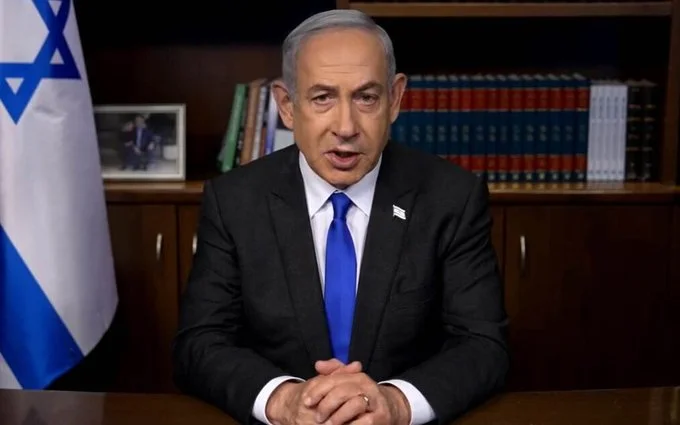Israeli Prime Minister Benjamin Netanyahu has responded to the US President Joe Biden’s recent announcement that if Rafah were to be invaded, he would withhold certain arms, such as artillery shells. The United States has already put a pause on a shipment of bombs to Israel.
On thursday, he responded by saying,” “If we have to stand alone, we will stand alone. If we need to, we will fight with our fingernails. But we have much more than fingernails.” (AP)
Mr. Netanyahu, who insists on the need to invade Rafah despite objections from the U.S., now sees the relationship between the two nations in crisis, possibly affecting his approach to the next phase of the war with Hamas.
Before Joe Biden’s announcement, Netanyahu in an interview to American TV host, Dr. Phil had remarked about the US president Joe Biden by saying, “We often had our agreements but we’ve had our disagreements. We’ve been able to overcome them. I hope we can overcome them now, but we will do what we have to do to protect our country,”
Current situation in Rafah
On Tuesday, Israel took control of the Gaza side of the Rafah crossing with Egypt, and there’s uncertainty about its reopening. Israel has claimed of reopening operations at Kerem Shalom crossing for aid trucks after a weekend rocket attack by Hamas. However, the U.N., the main humanitarian aid provider, reported that aid did not reach the Palestinian side.
Displaced and exhausted, tens of thousands of Palestinians in Rafah are dismantling their tents and gathering their belongings for a new journey. With the main hospital closed, there’s little medical care available for those suffering from malnutrition, illnesses, and injuries. Israel, on the other side maintains that Rafah stands as Hamas final stronghold and a big operation in the area is required to dismantle the group’s capabilities.
Benjamin Netanyahu facing pressure
Street protests led by families and supporters of over 130 hostages still held in Gaza have become a common sight in Israel. They’re calling for a ceasefire deal with Hamas to bring their loved ones back. Others, including far-right ministers in Netanyahu’s government, are calling to push forward with the Rafah operation, which started this week with airstrikes on the outskirts of the city.
On an international front too, pressures are mounting. The International Criminal Court (ICC) has reportedly discussed the possibility of issuing arrest warrants targeting Israeli Prime Minister Benjamin Netanyahu and other high-ranking officials. These warrants would be linked to allegations arising from the ongoing conflict with Hamas.
What happened to the ceasefire talks in Cairo?
During the ceasefire talks in Cairo, Hamas agreed to a ceasefire plan brokered by Egypt. The plan proposed stopping the fighting in exchange for swapping hostages for Palestinian prisoners. It was supposed to take place in stages. Israeli officials disagreed, accusing Hamas of changing the terms. However, Israel agreed to continue the negotiations further. Hamas later announced that its delegation, which had been participating in ceasefire talks in Cairo, had departed for Qatar. They emphasized that the “ball is now completely” in Israel’s court.
Conclusion
Amid escalating tensions, there is an urgent need for increased efforts to address the ongoing crisis and prevent further instability in the Middle East. The crisis in Gaza is widening, with thousands of displaced Palestinians in Rafah facing severe challenges and limited access to essential services. As pressure mounts both domestically and internationally for a ceasefire and peaceful resolution, it is important to prioritize dialogue and negotiation. Achieving peace in Gaza is not only essential for the well-being of the Palestinian and Israeli people but also crucial for regional stability and security.
Update-
The latest news about Benjamin Netanyahu involves internal government tensions. Israeli far-right minister Itamar Ben Gvir has criticized Prime Minister Netanyahu for excluding him from decisions related to the Gaza war, particularly after a security assessment on the escalation with Hezbollah. There are also opinions being shared about the ongoing conflict between Hamas and Israel, with discussions on the political implications for Netanyahu.
- Hezbollah militants fired dozens of Katyusha and Falaq rockets, targeting two northern Israeli towns, Kiryat Shmona and Kfar Szold, on June 14.
- The Israeli border town of Kiryat Shemona experienced a fresh wave of Hezbollah strikes with dozens of missiles fired from southern Lebanon, causing fires and property damage in northern Israel.
- There has been a call for tough action within the Israeli government, with far-right minister Itamar Ben Gvir criticizing Prime Minister Benjamin Netanyahu for excluding him from decisions related to the Gaza war and the escalation with Hezbollah.
There are diplomatic efforts underway to de-escalate tensions:
- French President Macron and US President Biden have announced enhanced coordination to prevent further escalation between Hezbollah and Israel.
- The United States has led diplomatic efforts to halt violence along the border with Israel, with France also seeking ways to calm tensions. Paris presented an initiative earlier this year seeking to end hostilities.
- A senior adviser to US President Joe Biden, Amos Hochstein, is at the heart of diplomatic efforts seeking de-escalation and mentioned a land border agreement between Israel and Lebanon as part of these efforts.
These initiatives aim to defuse regional tensions through joint efforts.










